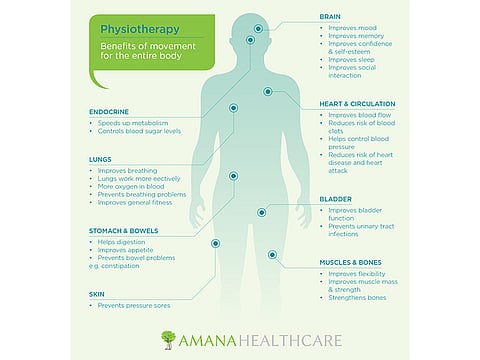Movement is medicine
Physiotherapy is a far more important part of healthcare than simply an effective means of treating physical injuries

Ask a professional physiotherapist about their work and a word that’s likely to crop up is movement. Movement is indeed at the heart of physiotherapy but the common misconception is that physiotherapy should only be used for treatment of physical issues such as sports injuries. Physiotherapy can actually be used to treat a number of different conditions ranging from neurological and muscular skeletal issues to treating patients with cardiorespiratory problems. Physio can also be used in the treatment of people following major surgery or patients who are suffering from post-delivery issues such as bladder problems. Children who have development issues such as slow movement and cancer patients can also benefit from physiotherapy.
At Amana Healthcare, a UAE-based provider of long-term acute care, post-acute rehabilitation and home care services, physiotherapists predominantly work with patients who suffer from neurological, complex medical and orthopaedic issues at a sub-acute and community level. Sub-acute patients are those who still require rehabilitation in a medical environment after leaving ICU and community refers to people who need treatment either at home or on an outpatient basis. Amana Healthcare takes a holistic approach to patients, setting goals based on patients’ ambitions, such as returning to education, work and previous life roles, and supports the patient throughout that journey.
Sarah Howley, Physiotherapist at Amana Healthcare, points out that movement or physiotherapy required to facilitate movement (for those who have limitations) can reduce the need for medication if applied properly. “If you move you can often stop the requirement for, or reduce the amount of medication needed for the prevention or management of diabetes, osteoporosis, heart disease, mental well-being, sleep, digestion and musculoskeletal degeneration or injury,” she says.
Deborah Pierce, Director of Clinical Operations at Amana Healthcare, believes that physiotherapy should be used more widely in the UAE and that it should be a part of the complete patient journey. “What we’re doing is building awareness that physiotherapy is important early on and throughout the journey. People should have access to specialised physiotherapy, even when they’re in an acute hospital. There is often limited access or awareness of the need for specialised physiotherapeutic intervention throughout a patient’s journey. For example, when a patient with a brain injury enters an ICU, then potentially moves to a neurosurgical ward before intensive rehabilitation and finally shifting to outpatient or community care, this patient is likely to have significantly better outcomes with specialised neurological physiotherapists (within specialist interdisciplinary teams) in the same way that they would be under the care of specialist doctors for their condition such as intensivists, neurologists and rehabilitation consultants.”
Amana Healthcare was the first provider of specialised sub-acute intensive inpatient rehabilitation and now provides a continuum of post-acute care for neurological, complex medical and orthopaedic patients. It now hopes the remarkable results achieved in improving quality of life for patients’ lives will encourage others to follow this lead.


